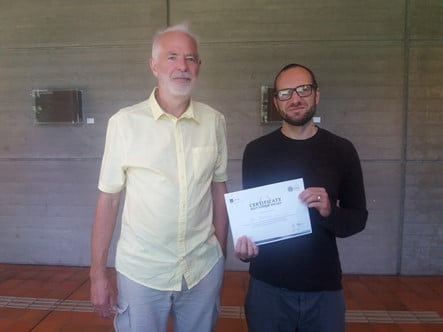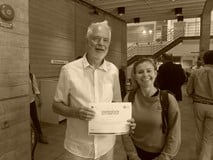We are pleased to announce the winners of the two poster awards sponsored by Entropy (ISSN: 1099-4300) from Quantum Information and Probability: from Foundations to Engineering (QIP22), which took place in Växö (Sweden) from 14 to 18 June 2022.
1st prize
"Delayed Choice and Bohmian Trajectories Investigated with Entangled Photons in a Double Slit"
by Jan Dziewior

Bohmian mechanics, a hidden-variable interpretation of quantum mechanics, ascribes reality to the positions and momenta of quantum particles at the cost of a non-local ontology. Thus, contrary to standard quantum mechanics, it allows one to conceive of definite particle trajectories while being fully compatible with the standard theory in all empirical predictions. Nevertheless, the plausibility of the Bohmian picture was called into question by a double-slit Gedankenexperiment conducted by Englert et al. [1], which initiated a lively controversy. While most of the proponents of Bohmian mechanics agreed with the predictions of Englert et al., their conclusions have been criticized. Here, the experimental realization of this Gedankenexperiment is presented. The conditions for the occurrence of so-called “surrealistic” trajectories are realized by using a pair of entangled photons, where one of the photons is sent into an optical double-slit interferometer. The average trajectories are recorded using a method inspired by weak measurements [2,3]. By avoiding the measurement of the second photon as long as the trajectories of the first one are measured, it is possible to realize a delayed choice scenario, fully illustrating the contrasting inferences of standard and Bohmian quantum mechanics.
[1] Englert, B., Scully, M., Sussmann G., Walther, H., Surrealistic Bohm Trajectories, Zeitschrift fur Naturforschung A, 47 1175-1186 (1992).
[2] Wiseman, H. M., Grounding Bohmian mechanics in weak values and bayesianism, New J. Phys. 9 165 (2007).
[3] Mahler, D. et al., Experimental nonlocal and surreal Bohmian trajectories, Science Advances, 2 2 (2016).
2nd prize
“Inconsistency of linear dynamics and Born's rule”
by Lotte Mertens

Modern experiments conducted using nanoscale devices come ever closer to bridging the divide between the quantum and classical realms, bringing experimental tests of objective collapse theories that propose alterations to Schrödinger’s equation within reach. Such objective collapse theories aim to explain the emergence of classical dynamics in the thermodynamic limit and hence resolve the inconsistency that exists within the axioms of quantum mechanics when assuming measurements can be described by quantum mechanics as well. Here, we show that requiring the emergence of Born’s rule for relative frequencies of measurement outcomes without imposing them as part of any axiom implies that such objective collapse theories cannot be linear. Previous suggestions regarding the proof of the emergence of Born’s rule in classes of problems that include linear objective collapse theories are analyzed and shown to include hidden assumptions.



